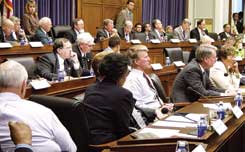 |
| Time: Conferees seem to be making little progress toward a pact. (Photo courtesy of House Transportation and Infrastructure Committee) |
The week of the conference, "I was sure that things were starting to move," says Brian Deery, senior director of the Associated General Contractors highway and transportation division. But as days passed, Deery says he then wasnt so sure. "If there are discussions going on behind closed doors, they are very tightly closed doors," he says.
Nick Yaksich, vice president for global public policy at the Association of Equipment Manufacturers, believes conferees can beat the deadline. "I think it could happen quickly once they get an agreement on a number," he says.
The "number" is the central issue. The Senate bill equals $295.1 bil-lion over six years. The House total is $283.9 billion and the White House insists it wont support anything higher. On June 7, Transportation Secretary Nor-man Mineta sent a 10-page letter to Young and Senate Environment and Public Works Committee Chairman James Inhofe (R-Okla.), reiterating the administrations veto threat unless conferees agree to $283.9 billion.
"Bridging the gap...is absolutely critical," says Rep. James Oberstar (D-Minn.). Some senators say the two sides should settle on a figure between the House and Senate totals. But House Majority Leader Tom DeLay (R-Texas), a key conferee, notes, "Its not as simple as some have said." DeLay says he agrees with President Bush that the bill is an important jobs producer. "But we also have the responsibility to be fiscally responsible in how we approach it," he adds.
Complicating the picture, DeLay also is an ardent defender of donor states, such as his own, which pay more into the Highway Trust Fund than they receive in federal highway aid. DeLay told conferees, "Its time for donor states to start to keep more of what they contribute." Industry officials contend, however, that donors desires cant be satisfied by a $283.9-billion bill.
| After the full Senate approves the measure, it would have to be reconciled with the version the House passed on May 19, which allots $850 million for Clean Water SRFs. President Bush had proposed slashing the program to $730 million. For drinking water SRFs, the Senate panel and the House each included $850 million, up $7 million from 2005. Under the House GOP bill, multi-employer plans less than 65% funded would be put in a "red zone" and have to take remedial steps, including higher employer payments, cuts in expenses and limits on benefit accruals. Senate Health, Education, Labor and Pensions Chairman Michael Enzi (R-Wyo.) plans to produce a pension bill by the August recess. After the bill clears the Senate, a difficult conference looms with the House, which approved its bill in April. |

Post a comment to this article
Report Abusive Comment